Film Name:猩球崛起3:終極之戰 / War for the Planet of the Apes
[Spoiler Alert: This text contains spoilers!]
To be perfectly honest, the movie I’ve been most looking forward to this summer is Planet of the Apes 3. Judging by reviews from various media outlets and audiences, it stands as the most critically acclaimed blockbuster of the summer—and perhaps the entire year—because it has the fewest flaws.
This film marks the conclusion of the “Rise of the Planet of the Apes” trilogy, the end of a legendary leader’s era, and the dawn of a new civilization for the apes…
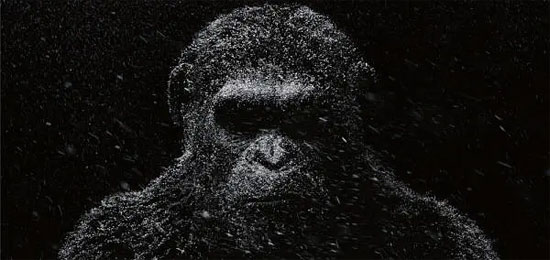
Let this ape, more human than humans themselves, be the final arbiter of all.
Technical aspects needn’t be discussed—the motion capture in this series has reached perfection, requiring no further elaboration. Instead, I wish to address its core essence.
After watching the film, my strongest impression is one of “comprehensive coverage”—on the surface, War for the Planet of the Apes seems to have addressed nearly every conceivable genre element and key aspect, showcasing remarkable versatility and completeness. Yet conversely, this conclusion lacks any truly standout, jaw-dropping highlights or a definitive “killer feature”… The result? It’s like finishing a meal that tasted good, yet you can’t shake the feeling that something was missing.
The most “clichéd” highlight of the Planet of the Apes series—the “ape vs. human battle”—is here! Right from the opening scene.
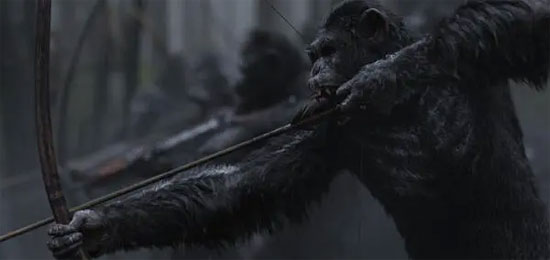
While Caesar still seeks peaceful coexistence with humans, humanity relentlessly advances deep into the mountains, attempting to decapitate the ape leadership. Conflict becomes inevitable… Human soldiers gain the upper hand with the “Donkey” unit’s assistance, only to be crushed by the ape army moments later. The clash of cold and hot weapons is quite compelling. For an opening battle, the film delivers a solid performance.
The timeless core narrative? Check! Caesar embarks on his path of vengeance.
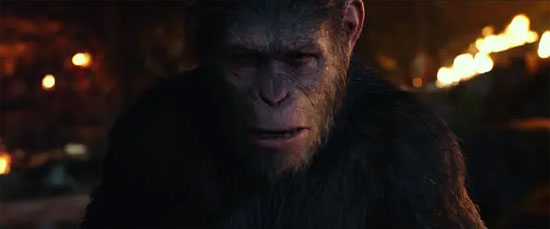
The Colonel remains unwavering in his mission to eliminate the enlightened ape leader. Thus, Caesar—who moments before shared tender moments with his wife and child—suddenly loses his two dearest loved ones. He must watch helplessly as his enemy escapes before the bodies of his family… Afterward, Caesar abandons his tribe’s migration to pursue vengeance alone. He senses Koba’s shadow within himself, an irresistible presence that haunts him relentlessly.
The sweeping, nature-filled cinematic landscape is still here! It’s practically half a road movie.
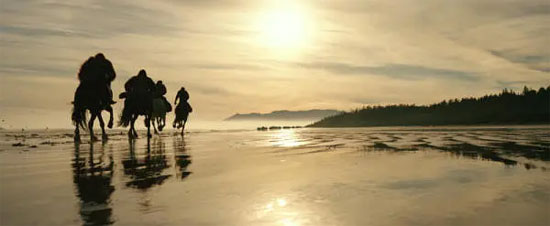
From the lush, verdant “Flower-Fruit Mountain Water Curtain Cave” to desolate ruins stripped bare, then to vast sandy beaches where sky meets sea, and finally to a fortress encased in ice and snow… With Maurice, Rocket, and Luca—the three apes—worried about Caesar, they pick up a speechless human girl along the way and encounter a talking solitary ape. Any combination of these elements could easily yield several scenes with outstanding visual impact.
Characters that are both hilarious and thought-provoking? Of course!
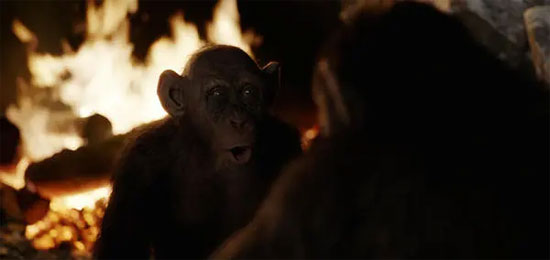
The mischievous ape steals the show. His character is brilliantly crafted—originally a zoo-raised gorilla, he’d already absorbed human manners and behavior. After his intelligence was further developed, he began living like a human: speaking, dressing, seeking safety and avoiding danger… Yet he remains fundamentally a gorilla, hiding to escape human extermination. This stark contrast and sense of incongruity provide ample comic relief, while also prompting reflection on the idea that “existence justifies reason” and whether other ape species might still exist in the outside world.
Scenes depicting characters grappling with self-awareness and inner turmoil? You bet!
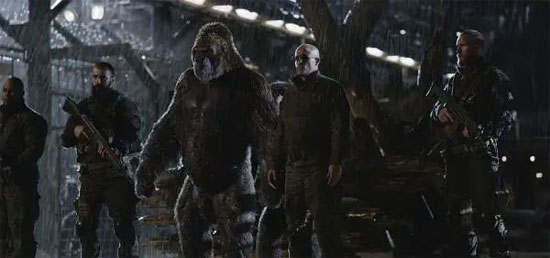
The Colonel’s stronghold is a microcosm of society. The most glaring example is “Red Donkey”—a minority ape who willingly serves as the Colonel’s henchman, slaughtering his own kind. His wavering stance and uncertainty about the future offer glimpses into deeper dilemmas… Moreover, the Colonel doesn’t exterminate the apes but exploits them as slave labor. The ensuing imprisonment, conflict, communication, escape, and flight all reflect the clashes between species, tribes, factions, ideologies, and beliefs.
Even a “Beauty and the Beast” or “King Kong” reimagining is present!
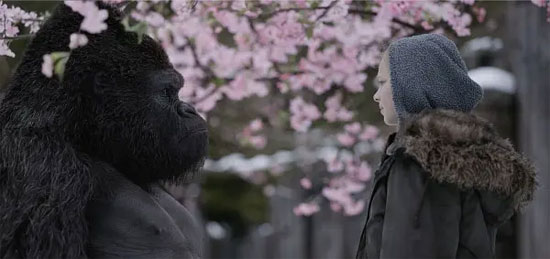
The little girl Nova stands as a radiant beacon amidst this world of apes and soldiers. This leads to a key premise of the film: while most humans succumbed to a deadly virus, a small number of immune survivors remained. Now, a mutation of the virus causes these survivors to suffer brain degeneration, eventually losing their ability to speak and think… After her sole protector is killed by Caesar, Nova becomes an orphan left to die. Taking her on the path of vengeance seems a grave mistake. Yet Maurice’s persistence earns a sliver of mercy from Caesar, and Nova’s innocence gradually wins the respect of Luca and others. By the end, she even becomes a crucial ally capable of turning the tide.
In stark contrast stands the film’s “main antagonist,” the Colonel. To prevent further viral spread, he defies orders and ruthlessly eliminates all infected individuals, repeatedly telling the ‘sentimental’ Caesar, “You’re too emotional!”…

It’s evident that in the film, apes grow increasingly human-like while humans regress toward savagery. Ironically, it is this very dehumanizing Colonel who, through a twist of fate, ultimately becomes infected by the virus himself, transforming into the very form he despised most…
It seems everything that should be there is present, yet why does it still feel lacking? Perhaps it is precisely this attempt to cover all bases that causes every exploration and effort to remain superficial.
Moreover, the third installment subverts the tone established by its predecessors—in Dawn of the Planet of the Apes, the apes thriving in the wild had flourished, and when Koba ignited the war, Caesar could muster an army to stand toe-to-toe with humanity. Yet in War for the Planet of the Apes, the apes suddenly appear as a persecuted minority, hiding in the shadows. Even counting all able-bodied males alongside women and children, their population seems scarcely larger than at the end of the first film. Conversely, the seemingly extinct humans now possess large, organized armies, bursting with unprecedented vitality.
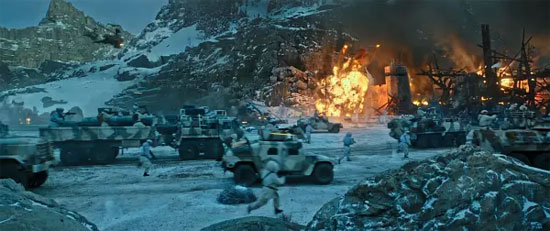
Thus, the “ultimate battle” in the film actually unfolds between humans, with the ape protagonists serving merely as fragile bystanders.
Combined with the earlier notion that “well-rounded development equals all-around mediocrity,” this results in:
– Those seeking a thrilling ape-human war spectacle get only a brief opening sequence;
– Those hoping to see species evolution mirroring social realities find the scope narrowed instead; If you seek a profound exploration of human nature, good, evil, beauty, and ugliness, you get only a superficial touch without depth; if you anticipate the rise of Earth’s future rulers, you witness an avalanche teaching everyone that only those who can climb trees become “survivors”; even watching the little girl Nova ultimately reduces her to merely becoming another member of the ape tribe…
Honestly, the film isn’t short on metaphors—it touches on politics, society, religion, and more. Take Caesar dragging his wounded body to lead the apes to a new homeland: some say it mirrors Moses in Exodus— —the prophet Moses, commanded by Yahweh, leading the enslaved Hebrews out of ancient Egypt toward the fertile land of Canaan. After over forty years of arduous wandering, he died just before reaching their destination. Ultimately, the Hebrews escaped bondage and became the first people in history to worship a single god…
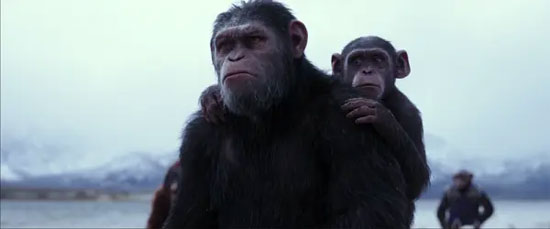
Ultimately, let’s draw an analogy with an essay exam paper. “War for the Planet of the Apes” clearly bears the mark of a “model student”—it covers all bases, draws from diverse sources, employs ornate language and classical allusions, and even crafts metaphors and subtleties requiring literary sophistication to grasp. Viewed through any individual grading criterion, it merits commendation and certainly wouldn’t receive a low score… Yet reading the entire piece, it’s hard to pinpoint the core focus. The overt themes and soul feel somewhat hollow and insipid, leaving a lingering sense of something missing.
Highly polished but lacking soul-stirring impact; visually appealing yet ultimately underwhelming. To conclude this way—one wonders whether it’s too conservative or too detached.
Please specify:Anime Phone Cases » War for the Planet of the Apes 猩球崛起3:終極之戰 2017 Film Review: A comprehensive finale